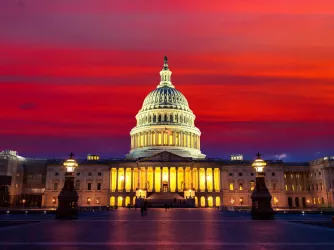Table of Contents
A problem predicted: recent calls for censorship invoke unconstitutional definition of anti-Semitism

FIRE has long predicted that use of the State Department’s definition of anti-Semitism will lead to calls for campus censorship, due to the definition’s unconstitutional overbreadth and vagueness when used to determine whether speech should be protected. FIRE most recently opposed the definition’s use when the Department of Education Office for Civil Rights used the definition as support to re-open a 2011 investigation into alleged anti-Semitism at Rutgers University last fall. As FIRE predicted, the definition is now cropping up throughout the country in support of demands to strip students and faculties of their First Amendment rights. (The U.S. Department of Education states that it “has not adopted any formal definition of anti-Semitism,” but the Department’s Office for Civil Rights has used it nevertheless.)
In an almost literary turn of situational irony, Frances Edwards, director of the Masters of Public Administration program at San José State University, referenced the definition while taking steps to oppose the presentation of a lecture titled “We Will Not Be Silenced: The Academic Repression of Israel’s Critics.” According to Palestine Legal, Edwards invoked the specter of civil rights claims against the university to pressure the lecture’s organizers to create a more “balanced” presentation, explicitly referencing OCR’s reopening of the investigation of Rutgers University, which invoked the State Department’s definition.
Edwards isn’t alone in using the definition to support threats of punishment for constitutionally-protected expression. The Zionist Organization of America — which filed and appealed the Rutgers decision from OCR — last fall demanded that the University of Michigan issue a “stronger response to comparisons of Israelis to Nazis” and “label those comparisons as anti-Semitic, as the U.S. government does in its working definition of anti-Semitism, and publicly condemn them.” (ZOA hyperlinked the words “working definition of anti-Semitism” to the State Department’s definition.) ZOA issued this demand after admitting that the president of the University of Michigan had publicly apologized when a lecturer compared Benjamin Netanyahu, the Prime Minister of Israel, to Adolf Hitler. ZOA did not specify what is required for a “stronger response” beyond the apology of a university’s president.
And the definition continues to appear in calls for campus censorship. Students at the University of California, Berkeley, for instance, have filed a claim with OCR because they perceive a vigil that jointly commemorates the deaths of the eleven killed last October at Pittsburgh’s Tree of Life Synagogue with three Gaza children who were killed by an Israeli missile strike as an anti-Semitic act that runs afoul of the “definition of anti-Semitism that was recently adopted by the DOE.” Also last fall, Rep. Brad Sherman of California, wrote Gene Block, the Chancellor of the University of California, Los Angeles, to encourage Block to prevent Students for Justice in Palestine from hosting a conference on the UCLA campus. Sherman alleged that the national SJP website might run afoul of the State Department definition. Fortunately, Chancellor Block rebuffed this attempt to silence discussion of Palestine, though history demonstrates that not all administrators stand up to political pressure.
FIRE will continue to keep track of troubling uses of this definition and advocate instead that universities heed the wisdom of Justice Louis Brandeis. In Whitney v. California (1926), Brandeis wrote, “If there be time to expose through discussion the falsehood and fallacies, to avert the evil by the processes of education, the remedy to be applied is more speech, not enforced silence.” FIRE believes there is nowhere better than a university for these “processes of education” to fully play out.
Recent Articles
FIRE’s award-winning Newsdesk covers the free speech news you need to stay informed.

One day after FIRE lawsuit, Congress passes changes to filming permits in national parks

VICTORY: FIRE lawsuit leads California to halt law penalizing reporters, advocates, and victims who discuss publicly known information about sealed arrest records

O holy fight: New Hampshire Satanic Temple statue threatened by more than vandals
